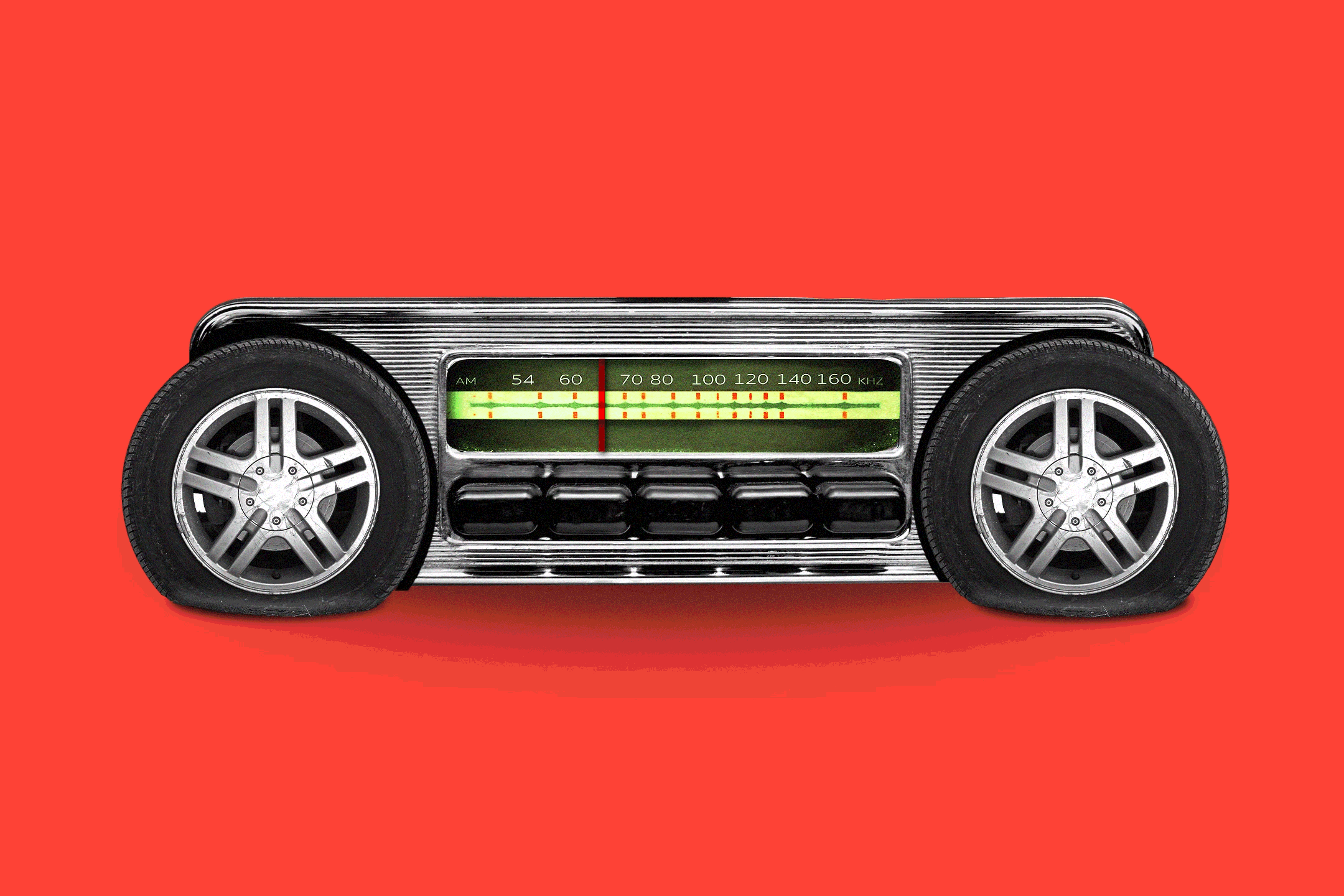‘Classic Rock’ Revolution Hits the Airwaves of England : Radio: Virgin Radio’s format is devoted to album-oriented rock of the last 25 years. ‘We’re the first legalized station to be allowed to play this kind of music,’ says the station’s chief executive.
- Share via
LONDON — Swashbuckling businessman Richard Branson has brought a self-proclaimed “radio revolution” to Great Britain with a new national station that would seem--to American ears--anything but revolutionary.
Virgin Radio hit the airwaves April 30 with a format devoted to “classic” album-oriented rock of the last 25 years. Lots of Bob Dylan, Jimi Hendrix, Led Zeppelin, Rolling Stones and that kind of thing.
Not exactly trend-setting sounds--not in this decade, that is.
What’s more, the station is broadcast in mono on AM, a frequency dispatched to second-class status long ago.
But in the world of British radio, this is a revolution. And Branson, the 43-year-old entrepreneur who built a small record label into a vast empire encompassing multimedia entertainment, retail stores and air travel, may have scored another coup providing soothing sounds for thirtysomethings.
“Britain’s a funny, quirky place with funny, quirky laws that restrict these things,” says David Campbell, the 33-year-old chief executive of Virgin Radio. “We’re the first legalized station to be allowed to play this kind of music.”
Unlike America, there has never been a place on the United Kingdom’s dial for the album rock that has served as the soundtrack to the baby-boomer generation. Ironically, a hefty proportion of that music was made by British bands.
In Britain, national radio stations--five from the non-commercial British Broadcasting Corp. and now, with Virgin, two commercial--account for most of the listening audience. And contemporary music radio is overwhelmingly dominated by the BBC’s Radio One, by far the most popular station in the country.
Although it provides some specialty shows such as soul, dance and world music, in the off-peak hours, Radio One’s playlist is primarily connected to the incredibly fluid and teen-influenced singles charts. That means a heavy dose of hits from artists like Kylie Minogue, Vanessa Paradis, Boyz II Men, Richard Marx and Take That.
Besides the national Radio One, there are local British music stations that generally follow the same chart-based formula with diversions into electronic dance music and golden oldies, themselves hit singles from the past.
“U.K. radio, as opposed to U.S. radio, is very restrictive in terms of both the number of different formats you can have and the number of different stations out there,” says Campbell, sitting in his office in London’s Soho district. “So, we’re revolutionary because what we’ve done is basically create a radio station for people who are too old for the charts and too young for the gold-type stations. There’s a big group in the middle who aren’t really being served by music at the moment on radio. That might sound completely stunning to people in America, but to people in the U.K., they’ve been sitting around without this music for many, many years.”
Campbell rejects complaints that Virgin Radio will be just another kind of oldies station, saying that the station will have a strong mix of new and newish music that is compatible with the best of the past.
But there is no shortage of critics.
“From our point of view, the more stations the merrier,” says Steve Sutherland, editor of the New Musical Express. “Having said that, my problem with Virgin Radio is it’s not broadcasting, it’s narrowcasting. Someone is deciding what’s classic and what isn’t for the listeners. I resent that they think all we want to listen to is the Police and the Eagles.”
Sutherland contends that the format will “encourage record companies to put more emphasis into releasing old Rod Stewart records” than in bringing out new artists. “Where are our classics going to come from in 10 years’ time?” he asks.
A Radio One spokesman snipes, “We’re not into recycling the past. We think the music industry has a future.” Virgin listeners probably already own the records being played on the station anyway “and would be better off playing them in stereo rather than listening in mono,” says the BBC spokesman, who asked not to be named.
Although BBC Radio One says it is unconcerned about facing its first national competitor, the station already has taken a number of steps to shore up its listenership. Among other moves, Radio One has instituted, for the first time, a weekly album chart countdown to go along with its singles chart. And it has placed a number of ads that swipe at the new competition without naming it.
One ad, showing an electric guitar player in mid-power chord, proclaims, “We’ve taken the grunge out of the reception. Not the music. Radio One is the only national rock station to broadcast on the FM band.”
The fact that there is no other national FM rock station has not been for lack of trying by broadcasters, however. The British government has specifically ruled it out.
Until recently, the BBC held a monopoly on national radio stations in Britain. Then, in 1990, the government announced it would open the airwaves to three new national, commercial radio stations--one on FM and two on AM.
It was good news for those interested in more choice. But the downside--from a rock lover’s point of view--was that the government announcement also decreed that the new FM station could only be used for a format “other than pop.” That was viewed as a thinly veiled maneuver to ensure that a classical music station would get the coveted FM frequency, with its superior sound quality.
A consortium of music companies that wanted to launch an album-oriented rock station on the new FM slot argued that “rock” and “pop” were vastly different musical forms and that a “rock” station, therefore, should be entitled to bid for the FM franchise.
But in an unprecedented legal decision, the British government ruled, after much heated debate, that rock and pop were the same thing. And the FM license was, indeed, awarded to a classical music station. (The new classical station now reaches twice as many listeners as the BBC’s national classical station, Radio Three.)
When the first national AM franchise was auctioned off, Branson stepped in with the winning bid. Convinced his format would be a winner, even in mono, he agreed to pay the British government nearly $3 million a year plus 4% of all advertising revenue for the broadcast license.
The question now is whether Branson can make it work. Few doubt he can.
Branson is considered a hero in Britain, a self-made multimillionaire who not only did it his way, but did it with elan--and without ever wearing a suit. His sweater is his trademark.
He built up his own record company, Virgin Music, and sold it last year to Thorn EMI for $973 million. He created his own airline, Virgin Atlantic, and challenged British Airways’ control of the air travel business in the U.K., fighting for airport slots and lucrative routes. He won huge damages from BA after proving the airline giant had been running a dirty-tricks campaign against Virgin.
In a poll last month, Branson was named as the role model most British people--young and old--would like to emulate. But he is an especially heroic figure to those in his own age group. And it is this group that is being targeted by Virgin Radio.
“I think the name Virgin is our biggest asset,” says station executive Campbell. “But we have to be careful about how we use it. It’s our biggest asset because the name Virgin means a lot to people--particularly in terms of music, particularly in terms of lifestyle and attitude. It also means we can’t do certain things. If we wanted to become a rap station and call ourselves Virgin we couldn’t do it because that doesn’t fit in with the Virgin image.”
True to form, Branson already has begun challenging the BBC’s domination of the radio airwaves just as he took on British Airways. He has called for a revamping of the way radio frequencies are allocated in general and, in particular, has suggested that Virgin Radio be allowed to swap its AM frequency for the FM spot now allotted to the BBC’s national talk radio station, Radio Four.
While no one has questioned the popularity or worth of the BBC talk station, Branson and others have complained that it could work equally well on AM and that its stereo FM frequency would be better suited to a music station.
Not surprisingly, the BBC immediately responded that it had no intention of giving up any of its FM slots.
But Branson has fired his opening volley and appears to be gaining support. And perhaps one day his “radio revolution” may lead to a true overthrow of the British broadcasting Establishment.
More to Read
The biggest entertainment stories
Get our big stories about Hollywood, film, television, music, arts, culture and more right in your inbox as soon as they publish.
You may occasionally receive promotional content from the Los Angeles Times.










